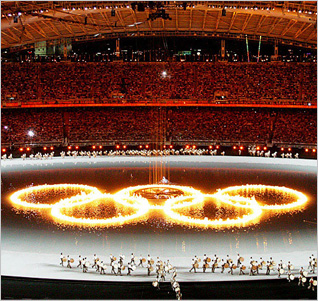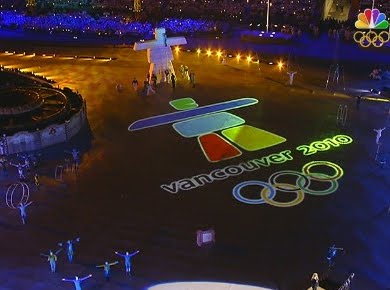
GOLD MEDAL FOR AN OLYMPIC PARTNER: The Power of Sponsorships and PR Value of the Olympic Games
As the world’s largest sporting event, participation in the Olympic Games is a dream come true for any athlete. And as the world’s largest PR and Marketing platform, it’s also a dream come true for any corporation – provided it has the money to join in the festivities. The 2010 Winter Olympics, officially the XXI Olympic Winter Games (Vancouver, Canada), a major international multi-sport event, would probably not even be possible without sponsors’ money. It’s estimated that this year’s Winter Games in Vancouver cost about C$2 billion to stage. While more than half of the money comes from the sale of broadcasting rights, 34% of the cash comes from sponsorships. Sponsors contribute cash, products and/or services. There are all sorts of sponsorship levels but none more prestigious – or expensive – than the elite members of the TOP (The Olympic Partners) Program. During 2010 Olympic Games the TOP are the following well-known companies: Coca Cola, Acer, Atos Origin, GE, McDonalds, Omega, Panasonic, Samsung, Visa. They must commit to a four-year cycle that covers both the summer and winter games.
In return, sponsors receive the exclusive rights to associate with the 2010 Winter Games (read great opportunity to advertise and establish a perfect PR exposure) and reach exposure to a huge demographic, since billions of people (“Olympic size audience”) are watching the Olympics. They are also entitled to use the Vancouver 2010 emblems and other Games-related marks in their advertising and promotions within Canada. Depending on the sponsorship level (National Partner, Official Supporter or Official Supplier), other sponsor benefits include preferred access to event tickets, Games-time accommodation, hospitality services, transportation and accreditation for staff and guests. They gain exclusive worldwide marketing rights to the Olympics and provide both products and services to the games themselves.
So how do Olympic Sponsors reach the target audience? (Olympic Sponsorship Channels)
- Direct TV, Radio and Broadcast Advertising
- Ad Banners at the location
- The Brand Name mentioned many and many times
- Media promotion
- On-site stands
Benefits of sponsorship
Sponsorship can provide benefits for the sponsor in the following areas:
- Brand equity: Sponsorship of the Olympic Movement can increase goodwill and esteem toward a sponsor as the ideals and spirit of the Olympic Games are associated with the sponsor’s brand.
- Business objectives: Sponsorship of the Olympic Movement can enhance core business objectives such as revenue goals, share goals, or brand awareness.
- Brand repositioning: Sponsorship of the Olympic Movement can assist a sponsor in repositioning itself.
- Internal rewards: Sponsorship of the Olympic Movement and the rights and benefits afforded to sponsors can be used internally to improve morale or motivate employees.
- Showcasing: The Olympic Games, as the world’s largest sporting event, provide unmatched opportunities for sponsors to showcase technology, products, or services.
- Defense: Part of a corporation’s decision to sponsor the Olympic Games is to benefit from the exclusivity of Olympic partnerships by keeping its competitors out.
- Altruism: Part of a corporation’s decision to sponsor the Olympic Movement may be derived from a desire to be a good corporate citizen.
TOP Partners receive exclusive marketing rights and opportunities within their designated product category. Partners may exercise these rights on a worldwide basis, and they may develop marketing programs with the various members of the Olympic Family. In addition to the worldwide marketing opportunities, TOP Partners receive:
- Use of all Olympic imagery, as well as appropriate Olympic designations on products
- Hospitality opportunities at the Olympic Games
- Direct advertising and promotional opportunities, including preferential access to Olympic broadcast advertising
- On-site concessions/franchise and product sale/showcase opportunities
- Protection from ambush marketing
- Acknowledgement of support through a broad Olympic sponsorship recognition program
How effective are Olympic Sponsorship is?
Okay, your brand spent all this money and received the exclusive right to associate with the 2010 Winter Games, but did you actually increase the brand awareness and product sales? Though it’s true there’s nothing marketers can do to 100 percent guarantee the sponsorships and events they choose will return the highest ROI possible, sponsorship engineering dramatically improves the odds of marketing success. But the world of scientific research proves the opposite. A recent Adweek Media/Harris Poll suggests many consumers are indifferent to the Olympic Sponsors. Conducted early this month, before the Games began, the survey asked respondents whether they’re more likely or less likely to buy a brand when it’s an official Olympic sponsor. A large majority (71 %) said such sponsorship “makes no difference” to them one way or another. Twenty percent said it makes them “somewhat more” likely to buy the brand, and 5 percent that it makes them “much more” likely to do so. Two percent said an Olympic sponsorship makes them “somewhat less” likely to buy the brand, and another 2 percent said it makes them “much less” likely. The caveat is that respondents may underestimate the effect Olympics-related marketing has on them. And let’s not ignore the fact that hardly anyone says such sponsorships make them less likely to buy the brand. Could all sorts of non-Olympic marketing make that boast?
So could Olympic Sponsorship be considered a PR stunt? Is its effectiveness directly related to the cost to be an Olympic Partner? Is it really worth to invest so much money without guaranteed return? Post the comments! We want you opinion.
By Inna Ovcharenko
If you have any questions for us, please feel free to check out http://www.LERPR.com or email us at info@lerpr.com!
For more info on our clients & services, check out: LERPR.com
Follow us on Twitter
Become a fan on Facebook


